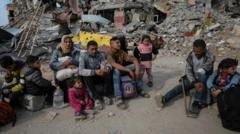Palestinian President Mahmoud Abbas launched a vigorous dissent against Trump’s plan, asserting that Gaza is an inseparable part of Palestine and that any move to displace its population would breach international law. In a statement, he emphasized the rights of Palestinians will not be compromised. Echoing Abbas, Hamas criticized the proposal as incendiary, aiming to escalate tensions in the region further.
Reactions from Arab nations were similarly negative. Saudi Arabia reaffirmed its stance that it will not normalize relations with Israel without a Palestinian state and reiterated commitment to Palestinian rights. Egypt also dismissed Trump’s suggestion to relocate Gaza’s residents, underscoring the need for reconstruction that allows Palestinians to remain in their homeland.
This rejection follows a fragile ceasefire established two weeks ago, during which Hamas released some Israeli captives in a prisoner exchange. The context of Trump's remarks peaks in light of ongoing devastation—over 47,000 deaths and significant displacement in Gaza—sparking widespread criticism against the idea of forced relocation.
Trump's vision for Gaza included creating a prosperous enclave, which he referred to as "the Riviera of the Middle East," suggesting displaced Palestinians could be settled in neighboring countries. This notion has been labeled unrealistic and unacceptable, with fears of repeating the historical traumas of the Nakba—the catastrophe during the formation of Israel when many Palestinians were displaced.
Countries echoing the condemnation include Turkey and France, both warning that attempts to displace Palestinians would constitute a direct violation of international law and undermine peace prospects in the region.
With the international community heavily scrutinizing Trump’s plan, Abbas firmly stated that Palestinians are committed to their homeland and will resist any external attempts to alter their demographic landscape. The ongoing Gaza conflict continues to demand urgent attention amid calls for humanitarian aid and efforts towards a stable resolution.
Reactions from Arab nations were similarly negative. Saudi Arabia reaffirmed its stance that it will not normalize relations with Israel without a Palestinian state and reiterated commitment to Palestinian rights. Egypt also dismissed Trump’s suggestion to relocate Gaza’s residents, underscoring the need for reconstruction that allows Palestinians to remain in their homeland.
This rejection follows a fragile ceasefire established two weeks ago, during which Hamas released some Israeli captives in a prisoner exchange. The context of Trump's remarks peaks in light of ongoing devastation—over 47,000 deaths and significant displacement in Gaza—sparking widespread criticism against the idea of forced relocation.
Trump's vision for Gaza included creating a prosperous enclave, which he referred to as "the Riviera of the Middle East," suggesting displaced Palestinians could be settled in neighboring countries. This notion has been labeled unrealistic and unacceptable, with fears of repeating the historical traumas of the Nakba—the catastrophe during the formation of Israel when many Palestinians were displaced.
Countries echoing the condemnation include Turkey and France, both warning that attempts to displace Palestinians would constitute a direct violation of international law and undermine peace prospects in the region.
With the international community heavily scrutinizing Trump’s plan, Abbas firmly stated that Palestinians are committed to their homeland and will resist any external attempts to alter their demographic landscape. The ongoing Gaza conflict continues to demand urgent attention amid calls for humanitarian aid and efforts towards a stable resolution.



















